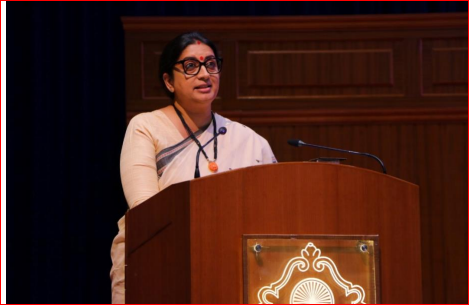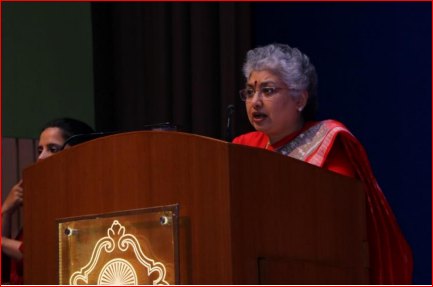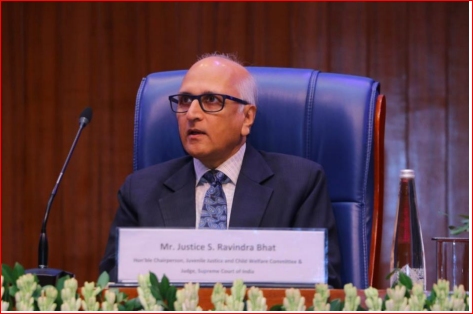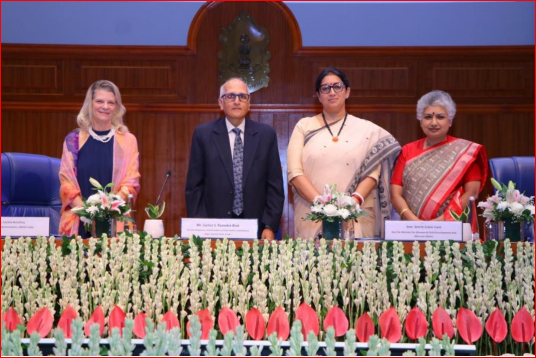In order to strengthen the justice delivery system for children in conflict with the law, as well as to devise the best possible way forward, the Supreme Court Committee on Juvenile Justice and Child Welfare, in partnership with UNICEF India, organised a two-day national consultation at the Apex Court premises.
The inaugural session on September 23 was graced by Union Minister of Women and Child Development Smriti Zubin Irani; Supreme Court judge and Chairperson of the Juvenile Justice and Child Welfare Committee Justice Ravindra Bhat, Supreme Court judge Justice B.V. Nagarathna and Cynthia McCaffrey, Representative of UNICEF India.
Speaking on the occasion, Smriti Zubin Irani said that the Government of India’s commitment towards children’s welfare and well-being reflected in its legislative and budgetary initiatives.

She said the Juvenile Justice Act, as amended in 2021, came into effect in 2022 along with the
amended rules. Much has been done to ensure that as a policy, non-institutional care of children
in family surroundings is prioritised over institutional care.
Much of the care that to be given has to be financially and infrastructurally provided for. The budget allocated by the Government for child welfare has increased from Rs 60 crore in 2009-10 to Rs 1,472 crore last year.
From 2014-2023, the Government, through child care institutions, has managed to provide assistance to over seven lakh children. It was not just one department, but efforts were being made by the government as a whole to look at children in need of protection and in need of welfare.
Justice Nagarathna said that the ambition of the Apex Court was to ensure a nation where all children were free from crime and violence; and where the contact of children with the justice system was rare, fair and beneficial. This vision was rooted in the need for a juvenile justice system that supported the development of children and youth who come into contact with it, she added.

A short video showcasing good practices on Children in Conflict with the Law: Prevention,
Restorative Justice, Diversion and Alternatives to Detention was also screened during the inaugural session.
Justice Bhat stressed upon the need for children’s reformation to be at the core of collective efforts in the context of children in conflict with the law.
He said the underpinning belief of justice for children initiatives was that children can and should be reformed and therefore, reformation must be the primary driver of all decisions taken for them.

This was the core belief that pivoted Restorative Practices, Diversion, Alternatives to Detention, and Child Friendly Legal procedures such as fair trials and child-friendly procedures, including legal and other appropriate assistance, he added.
The Supreme Court judge said that a child who has come into conflict with the law, was a child who has been in or/and continued to be in difficult circumstances. Therefore, it was imperative to prioritise a prevention approach. In transitioning from being stakeholders to shareholders in the care and protection of all children, especially the most vulnerable, prevention of child offending must receive utmost attention, he added.
Cynthia McCaffrey lauded the leading role played by India as a civilisation and as a member state of the UN, as a champion of the rights of children.
She said India was not only one of the early adopters of the Child Rights Convention in 1992, but the country has worked to translate the CRC into the right to education, the right to food, to water and sanitation, to social protection, and to empower girls against all forms of violence.
India’s comprehensive and ever improving child protection architecture, in particular, has stood for decades as a beacon for the most vulnerable children- both as a common minimum standard of dignity and as a catalyst for children, especially girls, to thrive and grow to their fullest aspirations, noted the representative of UNICEF India.
She further applauded the role played by the first responders, police, judges and prosecutors, social workers, counsellors and child helpline functionaries, who dealt with difficult cases and saved lives every day.
The inaugural session was followed by a series of presentations and thematic group discussions.
Key stakeholders from the Government of India, law enforcement agencies, senior members of the judiciary, state governments and civil society drew from their collective experience during these disciussions to drive conversations on prevention of juvenile crime, restorative justice and alternatives to detention.
The discussions concluded on September 24 with reflections from the Government of India, the Supreme Court and the National Council for the Protection of Child Rights and UNICEF.


